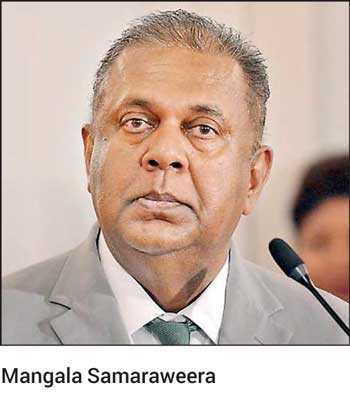Saturday Feb 21, 2026
Saturday Feb 21, 2026
Friday, 24 May 2019 00:02 - - {{hitsCtrl.values.hits}}
 In the Buddhist belief system, ‘Mangala’ means a ‘blessing’. In the abstract ‘Mangala’ denotes an ‘auspicious sign’.
In the Buddhist belief system, ‘Mangala’ means a ‘blessing’. In the abstract ‘Mangala’ denotes an ‘auspicious sign’.
In the ‘Mangala Sutta’, the Buddha has enumerated 38 of the highest blessings that we must or should be guided by.
Mangala says that Buddhism is not a religion. That it is a message to all mankind. He says that he follows the vision of the Buddha and does not regard it as an inflexible dogma held in hegemony by the Sinhala Buddhist tribe.
The monks insist otherwise. They contend that “Sinhala Buddhism is the exclusive preserve of Sinhala Buddhists. Anybody who thinks or suggests a contrary point of view, is neither a Buddhist nor a true Sinhalese.”
In the matter of Mangala vs Monks, I would frame my attempted adjudication in the context of one of the 12 stanzas in the homily known as the ‘Mangala Sutta’.
“He whose mind does not waver, by contact with worldly contingencies, sorrowless, stainless and secure; this is Blessing Supreme.”
Now, we must give the devil his due. Mangala did not waver. He stood by his conviction that there is a wide chasm between what the Buddha taught and what the Sinhala Buddhist Sangha preach. Now that is a ‘Mangala’ attitude.
At this point, I must record a caveat in defending Mangala. I fully stand by his libertarian humanism. With equal vehemence I condemn his neo liberal market anarchism.
With these paradigms set I venture to unravel the deadlock between Mangala and our monks with some help from Karl Marx.
The Daily Mirror carries a report of Mangala’s latest clarification made on Thursday 23 May in Parliament.
He has told the house that he will not call himself a Buddhist but a person who follows the Buddhist Philosophy.
“There is no religion called Buddhism as it is only a philosophy. Buddhism does not belong only to Sinhalese as Buddha’s teachings have covered the entire universe. Some Buddhist monks who think Buddhism is a religion create troubles in this country.”
 He has reiterated that those who are living in this country are Sri Lankans and the majority are Sinhalese Buddhists.
He has reiterated that those who are living in this country are Sri Lankans and the majority are Sinhalese Buddhists.
“I was scolded in raw filth for making a similar statement earlier. However, I would repeat that sentiment again.”
It seems that Khema’s boy is not afraid to be the boy on the burning deck.
“The boy stood on the burning deck, whence all but he had fled.” I weep for Mano Ganesan!
Mangala must also get off his high horse. The soaring eagle has one view. The grasshopper has a different view. Both views are true from their respective points of view.
The Monks claim that Sinhala Buddhism is a religion. Mangala claims that what Prince Siddhartha discovered after his runcination is a philosophy.
Any dimwit should know that both parties are right. There is no real argument here. An argument has a premise and a conclusion. Mangala and monks stand on different premises and it is only natural that they reach different conclusions.
Mangala’s Prince Siddhartha renounced his worldly kingdom. The monks are the historical custodians of the kingdom that offers the foremost position to Buddhism while guaranteeing religious freedom to all faiths.
Surely Mangala should comprehend Sinhala Buddhist clerical logic. An eminent prince of the Catholic Church has accepted their logic with such saintly sanguinity that he is now a serious candidate to be inducted as an honorary grand vizier of the Sinhala Buddhist Klan.
The monks are right. Sinhala Buddhism is not a philosophy that is open for debate or dissension. Sinhala Buddhism is a religion. It is a doctrine of faith. It demands acceptance allegiance and unreserved loyalty. It is the most primal form of insidious authority.
Karl Marx respected religion. He more than any philosopher understood the purpose of religion. Religion is the fulcrum on which the exploitative process balances the accumulation of wealth and the sanctity of private property and capital.
The accurate context in which the oft misquoted Marxian cliché is this.
“Religion is the sigh of the oppressed creature, the heart of a heartless world, just as it is the spirit of a spiritless situation. It is the opium of the people.”
Can we reasonably dispute this little dose of Marxist wisdom?
Isn’t Sinhala Buddhism the spirit of a sprit less situation? Can we not wholeheartedly endorse the Marxist proposition that ‘Sinhala Buddhism’ as opposed to what the Buddha taught is the heart of a heartless world?
Can we ignore the cold logic of Karl Marx is asserting that religion is the sigh of the oppressed creature on whose behalf an Anunayake of the Asgiriya chapter demanded that Gotabaya should decide to be another Hitler?
Marx maintained that all criticisms begin with the criticism of what we call religion.
When he said that religion is the sigh of the oppressed class, he was reaffirming a truth that stares at us every time a politician visits a monastery in Kandy to offer ‘ataprikara’ and exchange profound inanities.
Those politicians demonstrate that religion is their crutch to lean on to escape our hostility. We don’t need Marx to remind us that we live in a hostile world.
Karl Marx said that philosophers have only interpreted the world in various ways; the point was to change it.
This dictum is carved on the gravestone of Karl Marx at the Highgate cemetery.
If only Khema’s boy reads Karl Marx instead of reading the old budget speeches of Ronnie De Mel!